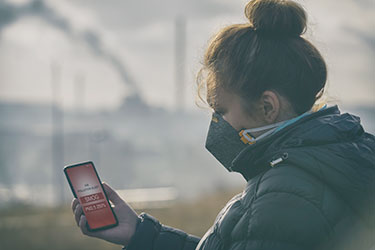Climate justice is about creating communities where health and racial equity are mainstays, and where people have resilience in the face of climate change. The issue is an important one for both public health and APHA, which chose “Galvanizing Climate Justice” as today’s National Public Health Week theme.
Across the U.S., disadvantaged communities bear the brunt of climate change effects, including extreme weather and heat. Disadvantaged communities are often located near highways or industries that produce pollutants, worsening health risks for residents.
“There is no bigger threat to our health or to American prosperity than the threat of climate change,” says Gina McCarthy, MS, White House national climate advisor, in her new NPHW message. “While climate change affects everyone, it does not affect everyone equally.”
Climate justice lifts up communities by creating policies and programs that re-imagine infrastructure and change zoning laws and other harmful regulations. Simple grassroots programs — such as tree planting, community exercise and outdoor safe zones — can also have big impacts.
Today’s NPHW theme aligns with the vision of APHA’s Center for Climate, Health and Equity, which believes climate change “should be treated as a national priority and garner broad political and social support,” said Susan Polan, PhD, APHA’s associate executive director for public affairs and advocacy.
“All people have the right to live, work and play in communities that are safe, healthy and free of life-threatening conditions,” Polan said.
Learn more about climate justice on the NPHW website and make plans to take part in today’s NPHW events.
Watch and share: NPHW message from Gina McCarthy
“Climate change is an environmental injustice,” says former Environmental Protection Agency Administrator Gina McCarthy. Watch and share her NPHW message.
(Photo by humonia, courtesy iStockphoto)